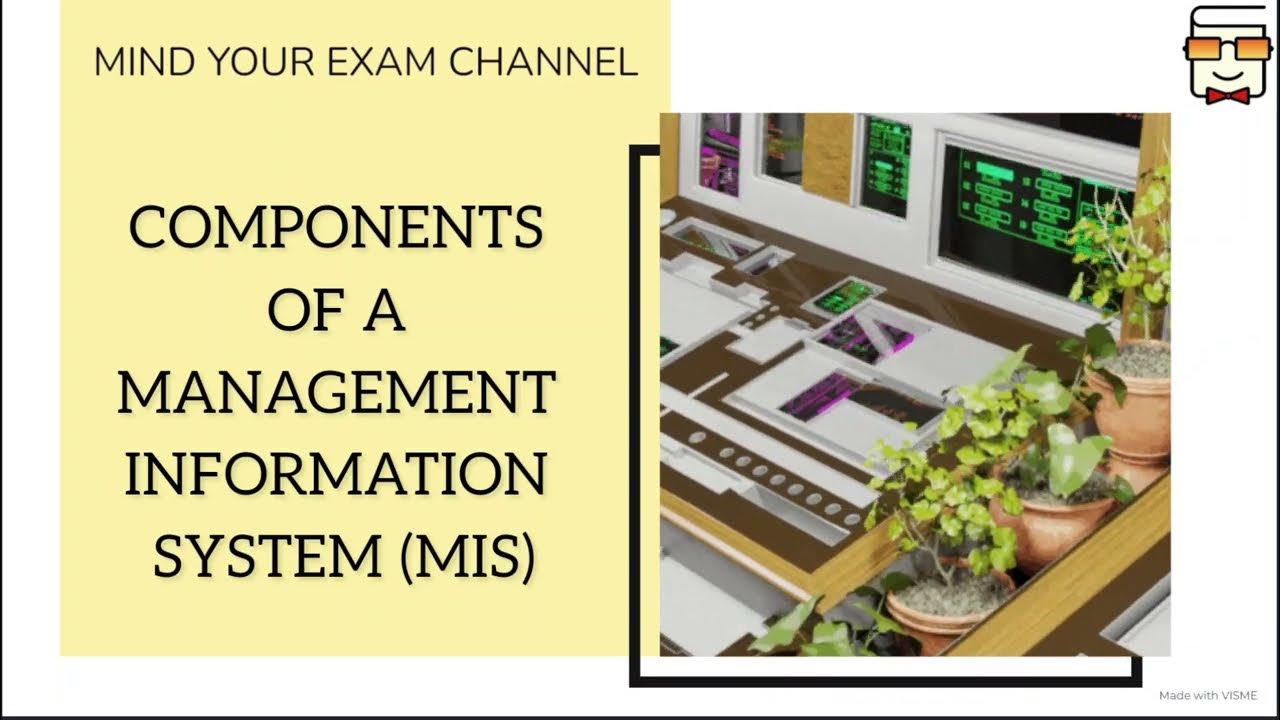The 5 Components of an Information System
Summary
TLDRThe video script delves into the concept of an information system, highlighting its five core components: hardware, software, data, people, and processes. It emphasizes that information systems are not just about computers but encompass the interactions between technology, users, and business procedures. The instructor stresses the importance of understanding each component, especially for those pursuing a career in the field. Mastery of these elements is crucial for success, as it enables professionals to optimize business operations and leverage technology effectively.
Takeaways
- 💡 An information system is a complex structure made up of five key components: hardware, software, data, people, and processes.
- 🖥️ Hardware refers to the physical components of an information system, such as computers, monitors, keyboards, CPUs, and even mobile devices like smartphones.
- 💿 Software is the set of instructions that tell the hardware what to do. It can be categorized into operating systems, applications, and utilities, and is crucial for manipulating hardware.
- 📊 Data is the raw information that software manipulates. It can be structured in databases or exist as media files in applications like iTunes.
- 👥 People are an integral part of information systems, including users, programmers, analysts, IT staff, and other personnel who contribute to the system's operation and management.
- 🔄 Processes are the ordered steps or procedures followed to achieve a specific goal within an information system. They are vital for business efficiency and can significantly impact a company's bottom line.
- 🏢 Information systems extend beyond computing devices, highlighting the importance of networking people and processes to achieve organizational objectives.
- 📈 Businesses invest heavily in documenting and optimizing their processes, as even minor improvements can lead to substantial cost savings on a large scale.
- 🎓 The course aims to equip students with a comprehensive understanding of all five components, preparing them for successful careers in managing information systems.
- 🛠️ Practical skills like building a computer, systems analysis, and project management are emphasized, showing that a career in information systems requires a blend of technical and interpersonal expertise.
- 💼 The speaker encourages business majors to consider information systems as a career path, highlighting the diverse skill set required and the potential for significant professional growth.
Q & A
What are the five components of an information system?
-The five components of an information system are Hardware, Software, Data, People, and Process.
What is meant by Hardware in the context of information systems?
-Hardware refers to the physical devices used in information systems, such as computers, monitors, keyboards, CPUs, mobile phones, and any other devices with a chip in it.
Can you provide examples of software?
-Examples of software include programs like Excel, Windows 7, and Photoshop.
What is the role of software in an information system?
-Software tells the hardware what to do, manipulating the hardware to bring about a desired result.
How is data defined in the context of information systems?
-Data is defined as the pieces of information that are manipulated by the software.
What is the significance of people in an information system?
-People are significant in an information system as they are the users, programmers, analysts, IT department, and all those involved in making the system work.
What is a process in the context of information systems?
-A process is a set of steps taken to accomplish a goal, and in business, it can involve procedures and flowcharts that are crucial for efficiency and improvement.
Why are business processes important in information systems?
-Business processes are important because improving them, even by a small margin, can lead to significant cost savings for large companies.
What skills are necessary for success in a career in information systems?
-For success in information systems, one must master not only technical skills but also business processes and people skills.
How does the class on management of information systems plan to cover the five components?
-The class plans to cover the five components by discussing them in different ways throughout the term, including lectures, guest speakers, and practical examples.
What is the significance of mastering all five components of an information system for a career?
-Mastering all five components is significant as it allows individuals to understand the full scope of information systems, leading to more comprehensive solutions and greater career success.
Outlines

Cette section est réservée aux utilisateurs payants. Améliorez votre compte pour accéder à cette section.
Améliorer maintenantMindmap

Cette section est réservée aux utilisateurs payants. Améliorez votre compte pour accéder à cette section.
Améliorer maintenantKeywords

Cette section est réservée aux utilisateurs payants. Améliorez votre compte pour accéder à cette section.
Améliorer maintenantHighlights

Cette section est réservée aux utilisateurs payants. Améliorez votre compte pour accéder à cette section.
Améliorer maintenantTranscripts

Cette section est réservée aux utilisateurs payants. Améliorez votre compte pour accéder à cette section.
Améliorer maintenant5.0 / 5 (0 votes)






